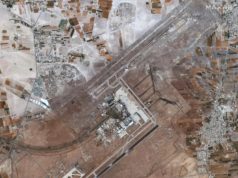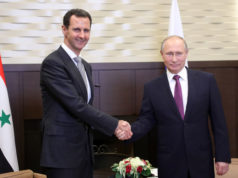More than 50 people died when a car bomb exploded in the Mazraa neighborhood of Damascus on Thursday. Syrian state TV reported 200 people were injured from the blast close to the city center. Opposition activists and local residents also report three more bombings in Damascus that day and a mortar attack on the Syrian Army’s General staff headquarters.
Bystanders described the bomb exploding at a security checkpoint between the ruling Ba’ath party headquarters and the Russian embassy. “Everything in the shop turned upside down” said one witness with the windows at the Russian Embassy also blown out. Free Syrian Army (FSA) spokesman Hussam Nassar denied the main rebel group played a role in the attack. Targeting a checkpoint near schools and hospitals was inappropriate he said, blaming the attack on the Syrian government.

Syrian security agents next to a vehicle on fire following a huge explosion in Damascus on Feb. 21, 2013. (Photo: SANA via AP) |
Jabhat al-Nusra, a rebel militia linked to al-Qaeda, took responsibility for several large bombings in Damascus over the past year and 17 attacks around the city in February. The group was blacklisted by the U.S. government and is not part of the FSA. Al-Nusra militants have made sizable victories, especially in Aleppo, against the Syrian military using foreign jihadist. Courts under the militants use religious leaders to make decisions and impose Sharia law.
The Syrian government continues unleashing attacks across the country, with a rocket killing 19 last week in Aleppo, but rebel forces have advanced on Damascus. Both sides launch offensives in outlying neighborhoods of the city with shelling and gunfire heard across the city earlier this month.
As the civil war continues, Salafi jihadists continue to pour into Syria. Their strength is rising in comparison to the FSA. The West’s refusal to provide adequate weapons to the FSA contributes to the current stalemate and makes more likely that the most extreme elements in Syria will have a stake in the country’s future if Asad falls.





